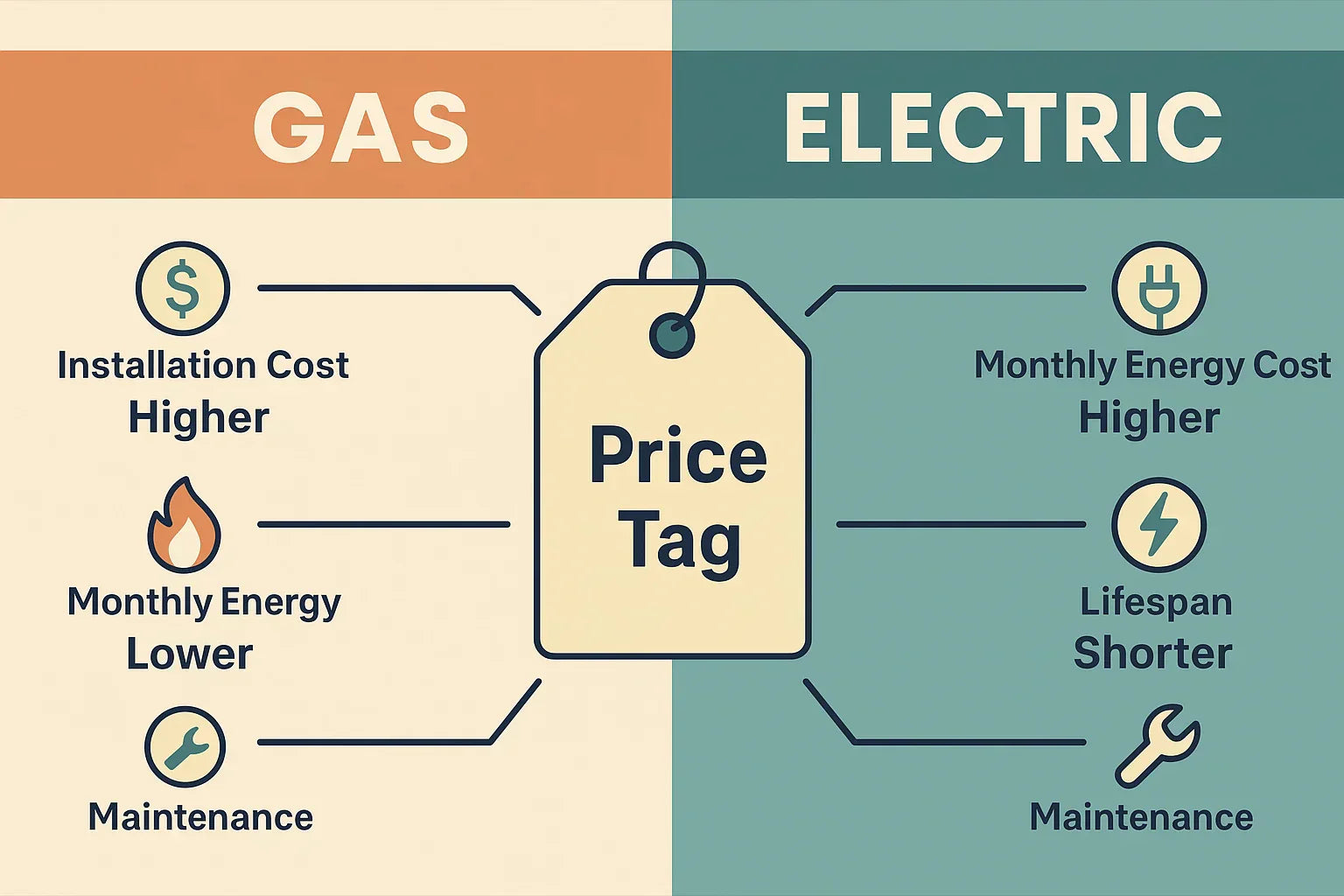By Alex Lane | Your Home Comfort Advocate
If you’re in the market for a new furnace in 2025, one of the first decisions you’ll face is whether to go with gas or electric. They might look similar from the outside, but when it comes to installation costs, energy bills, and long-term value, the differences are substantial.
In this guide, we’ll walk you through the true cost of ownership for gas vs. electric furnaces—including purchase price, monthly energy use, maintenance, and efficiency. If you want a budget-friendly option that doesn’t surprise you later, this breakdown is for you.
🔧 Upfront Cost Comparison
Equipment & Installation Prices
The initial cost of a furnace includes two things: the unit itself and the installation. On average:
-
Electric furnaces cost between $2,000 and $4,000 installed
-
Gas furnaces typically range from $3,800 to $6,000 installed
Why the difference? Gas systems are more complex. They require venting, gas lines, and safety components that drive up both labor and permit costs.
According to Angi, installation labor alone for gas units can add $1,500–$2,500 to your bill, especially if duct or flue upgrades are needed.
🛑 Don’t forget permits: Local codes may require combustion testing, venting inspections, or electrical upgrades, especially for older homes.
When Electric Wins Upfront
Electric furnaces are easier to install, especially in homes that lack a gas line. No chimney or exhaust flue is required, and the units are more compact—making them a good fit for tight basements or attics.
💰 Energy Use & Operating Costs
Upfront price only tells half the story. Over 15–20 years of use, operating costs can add up to 3–4x the purchase price—especially if you’re heating a large space.
Gas: Lower Monthly Bills (Usually)
Gas is usually cheaper than electricity on a per-BTU basis. In colder climates or regions with low natural gas rates, gas furnaces often cost 30–50% less to operate.
-
AFUE Ratings (Annual Fuel Utilization Efficiency) for new gas furnaces range from 80% to 98%.
-
Higher AFUE = more heat for your dollar, especially in high-performance models.
Use Energy.gov’s fuel cost comparison to estimate costs in your area.
Electric: Efficient but Pricey
Electric furnaces convert nearly 100% of energy into heat—but electricity costs more per unit than gas in most U.S. regions.
According to EnergySage, a typical electric furnace draws between 10,000 and 50,000 watts, which can result in $200–$400 per month in winter if your utility rates are high.
Check your local electric rates with the EIA’s interactive map before choosing.
🔄 Maintenance, Safety, and Lifespan
Gas Furnace Considerations
-
Requires annual maintenance for burner tuning, gas line checks, and heat exchanger inspection.
-
Risk of carbon monoxide leaks, making regular servicing critical.
-
Average lifespan: 15–20 years
Electric Furnace Considerations
-
Fewer moving parts = lower maintenance costs
-
No combustion = no CO risk, no flue required
-
Average lifespan: 20–30 years
Per Carrier’s furnace repair guide, electric systems can often outlast gas units by a decade with basic filter changes and occasional electrical inspections.
🏆 Total Cost of Ownership: Who Comes Out Ahead?
Let’s look at the long-term cost picture—including purchase, operation, and maintenance over 20 years:
| Gas Furnace | Electric Furnace | |
|---|---|---|
| Upfront Cost | $4,000–$6,000 | $2,000–$4,000 |
| Annual Energy Cost | $600–$1,200 | $900–$1,800 |
| Maintenance (20 yrs) | ~$2,000 | ~$800 |
| Estimated Lifespan | 15–20 years | 20–30 years |
| Safety Equipment Needed | CO Detector | None |
| Best For | Cold climates | Mild climates |
🌎 Climate Makes the Difference
Your location plays a huge role in which furnace makes more financial sense:
-
Cold climates (Midwest, Northeast): Gas wins—faster heat, lower bills, longer runtime.
-
Mild climates (South, West Coast): Electric can make more sense—fewer heating days = lower impact on utility bill.
Need help matching furnace types to region? Check out our next post:
👉 2025 Furnace Installation Costs by Home Size and Location
💬 Final Thoughts from Alex Lane
There’s no one-size-fits-all answer when it comes to gas vs. electric furnaces. The right choice depends on your budget, energy rates, home setup, and climate.
If you already have a gas line and live somewhere with cold winters, gas still delivers the most bang for your buck. But if you're in a warmer state, want a safer system with less maintenance, or are trying to move away from fossil fuels, electric might be the smarter play.
Want to compare full install prices and models?
👉 Start with our full breakdown: How Much Does a New Furnace Cost?
Alex Lane
Your Home Comfort Advocate







